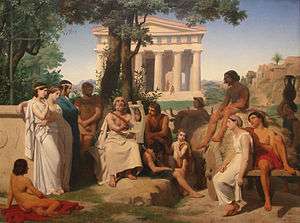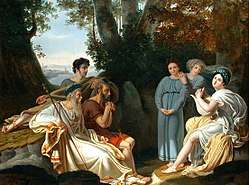Ancient accounts of Homer
The ancient accounts of Homer include many passages in archaic and classical Greek poets and prose authors that mention or allude to Homer, and ten biographies of Homer, often referred to as Lives.

Date of Homer
Establishing an accurate date for Homer's life presents significant difficulties. No documentary record of his life is known to have existed other than his writings of the Odyssey, as well as the Iliad. All accounts are based on tradition. Only one explicit date exists. Herodotus maintains that Hesiod and Homer lived not more than 400 years before his own time, consequently not much before 850 BC.[1] Artemon of Clazomenae, an annalist, gives Arctinus of Miletus, a pupil of Homer, a birth date of 744 BC. Received opinion generally dates him approximately between 750 and 700 BC.[2]
The lives and the epigrams

There are 10 known extant lives of Homer. Eight of these are edited in Georg Westermann's Vitarum Scriptores Graeci minores,[3] including a piece called the Contest of Homer and Hesiod.[4] The longest Life of Homer is written in the Ionic dialect, and claims to be the work of Herodotus, but is certainly spurious (Pseudo-Herodotus).[5] In all probability it belongs to the 2nd century AD, which was fruitful beyond all others in literary forgeries. The other lives are certainly not more ancient.
The lives preserve some curious short poems or fragments of verse attributed to Homer, the so-called Epigrams, which used to be printed at the end of editions of Homer. They are numbered as they appear in Pseudo-Herodotus. These are easily recognized as popular rhymes, a form of folklore to be met with in most countries, treasured by the people as a kind of proverbs.
In the Homeric epigrams the interest turns sometimes on the characteristics of particular localities, for example, Smyrna and Cyme,[6] Erythrae,[7] and Mt Ida;[8] others relate to certain trades or occupations: potters,[9] sailors, fishermen, goat herds, etc. Some may be fragments of longer poems, but evidently they are not the work of any one poet. The fact that they were all ascribed to Homer merely means that they belong to a period in the history of the Ionian and Aeolian colonies when Homer was a name which drew to itself all ancient and popular verse.
Again, comparing the epigrams with the legends and anecdotes told in the Lives of Homer, one can hardly doubt that they were the chief source from which these Lives were derived. Thus Epigram 4 mentions a blind poet, a native of Aeolian Smyrna, through which flows the water of the sacred Meles. Here is doubtless the source of the chief incident of the Herodotean Life, the birth of Homer, named Son of the Meles to conceal a scandalous affair between his mother and an older man who had been appointed her guardian. The epithet Aeolian implies high antiquity, inasmuch as according to Herodotus and Pausanias, Smyrna became Ionian not too long before 688 BC. Naturally the Ionians had their own version of the story, a version which made Homer come out with the first Athenian colonists.
The minor poems
The same line of argument may be extended to the Hymns, and even to the works of the so-called Cyclic poets, the lost early epics some of which formed the Epic Cycle and Theban Cycle. Thus:
- The hymn to the Delian Apollo ends with an address of the poet to his audience. When any stranger comes and asks who is the sweetest singer, they are to answer with one voice, "the blind man that dwells in rocky Chios; his songs deserve the prize for all time to come." Thucydides, who quotes this passage to show the ancient character of the Delian festival, seems to have no doubt of the Homeric authorship of the hymn. This does not necessarily imply that Homer was born a Chian: many accounts say that he was from Smyrna and lived in Chios later in his life.
- The Margites, a humorous poem which kept its ground as the reputed work of Homer down to the time of Aristotle, began with the words, "There came to Colophon an old man, a divine singer, servant of the Muses and Apollo." Hence the claim of Colophon to be the native city of Homer, a claim supported in the early times of Homeric learning by the Colophonian poet and grammarian Antimachus. However, this does not contradict Homer being from Smyrna, because Smyrna was founded by Colophonians and there was a close link between the two cities, possibly unfriendly. The Suda reports (almost certainly drawing upon ancient accounts that are now lost) Homer being a Smyrnaean that was taken as captive to the Colophonians in a war, hence the name Ὅμηρος, which in Greek means "captive". Homer's name originating from him being a captive is widely reported.
- The poem called the Cypria was said to have been given by Homer to his son-in-law Stasinus of Cyprus as dowry. The connection with Cyprus appears further in the predominance given in the poem to Aphrodite.
- The Little Iliad and the Phocais, according to the pseudo-Herodotean life, were composed by Homer when he lived at Phocaea with a certain Thestorides, who carried them off to Chios and there gained fame by reciting them as his own. The name Thestorides occurs in Epigram 5.
- A similar story was told about the poem called the Capture of Oechalia, the subject of which was one of the exploits of Heracles. It passed under the name of Creophylus of Samos, a friend or (as some said) a son-in-law of Homer, and was sometimes said to have been given to Creophylus by Homer in return for hospitality.
- Finally, the Thebaid was confidently counted as the work of Homer. As to the Epigoni, which carried on the Theban story, there was less certainty.
These indications render it probable that the stories connecting Homer with different cities and islands grew up after his poems had become known and famous, especially in the new and flourishing colonies of Aeolis and Ionia. The contention for Homer, in short, began at a time when his real history was lost, and he had become a sort of mythical figure, an anonymous hero, or personification of a great school of poetry. However, Smyrna remains by far the most likely candidate.
Arctinus of Miletus
An interesting confirmation of this view from the negative side is furnished by the city which ranked as chief among the Asiatic colonies of Greece, Miletus. No legend claims for Miletus even a visit from Homer, or a share in the authorship of any Homeric poem. Yet Arctinus of Miletus was said to have been a disciple of Homer, and was certainly one of the earliest and most considerable of the Cyclic poets. His Aethiopis was composed as a sequel to the Iliad; and the structure and general character of his poems show that he took the Iliad as his model. Yet in his case we find no trace of the disputed authorship which is so common with other Cyclic poems. How has this come about? Why have the works of Arctinus escaped the attraction which drew to the name of Homer such epics as the Cypria, the Little Iliad, the Thebaid, the Epigoni, the Capture of Oechalia and the Phocais? The most obvious account of the matter is that Arctinus was never so far forgotten that his poems became the subject of dispute. This may provide a glimpse of an early post-Homeric age in Ionia, when the immediate disciples and successors of Homer were distinct figures in a trustworthy tradition when they had not yet merged their individuality in the legendary Homer of the Epic Cycle.
Notes
- Herodotus, Histories 2.53.
- Homer; Rieu, EV (translator); Rieu, DCH (editor); Jones, Peter (editor): The Odyssey (Penguin, 2003), p. i.
- Westermann, Antonius (1845). ΒΙΟΓΡΑΦΟΙ: Vitarum Scriptores Graeci Minores. Brunsvigae: Georgius Westermann. Downloadable Google Books.
- Westermann, pages 33-45. Greek language text.
- Westermann, pages 1-20. Greek language text. An English translation can be found at Buckley, Theodore Alois (1891). The Odyssey of Homer: with the Hymns, Epigrams, and Battle of the Frogs and Mice: Literally Translated, with Explanatory Notes. London: George Bell and Sons. pp. vi–xxxii. Downloadable Google Books
- Epigrams 1, 2, 4, Buckley pages 427-428.
- Epigram 8, Buckley page 429.
- Epigram 10, Buckley page 429.
- Epigram 14, Buckley page 431.
See also
![]()
